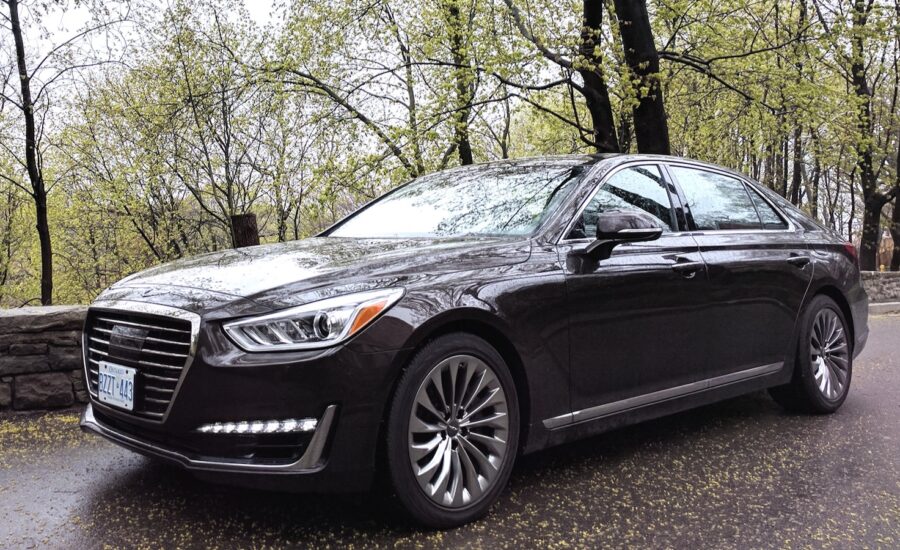Genesis G90 review: The best used large luxury car
Looking for a used large luxury car? Consider a Genesis G90. Here’s why it’s one of Canada’s best pre-owned cars, and what to check for when shopping.
Advertisement
Looking for a used large luxury car? Consider a Genesis G90. Here’s why it’s one of Canada’s best pre-owned cars, and what to check for when shopping.

Not long after Hyundai spun its Genesis sub-brand off into its own luxury brand powerhouse, the awards and trophies started to roll in. Delivering a fully loaded luxury driving experience for about the starting price of a base-model vehicle from pricier competitors meant that Genesis had little trouble moving a lot of cars and SUVs into a lot of driveways. At-home delivery included, of course. Here’s why the Genesis G90 3.3T made my list of the 10 best used cars in Canada.
Yes, it’s a great car. Before we go into details, though—we know some readers are thinking, “Genesis, eh? Haven’t we heard that name before?” Hyundai used to offer two cars called “Genesis”: a sports coupe and a luxury sedan. During this era, the company launched a whole new luxury brand, dubbed Equus. Realizing that it was fostering more confusion than sales, Hyundai decided to do some streamlining. The Equus brand was quietly euthanized and the Genesis coupe and sedan were put to pasture, but not before donating their name to Hyundai’s next take on a luxury brand, now called … Genesis.
In under 60 seconds, get matched with a personalized list of loan providers based on your needs and approval likelihood. No SIN required.
The Genesis G90 is the brand’s flagship model. The first-generation car hit the road for model years 2017 to 2022. An all-new G90 was launched for model-year 2023.
The G90 comes with, well, everything: adaptive cruise control, top-notch build quality and materials, as well as a heaping amount of refinement. Looking inside, you can tell Hyundai was serious about the whole luxury thing—and how! You will never confuse the G90’s interior for that of a lesser model, and it’s a huge leap forward even over the Equus, which itself was no Hyundai Pony inside.
Let’s start with the seats: They’re trimmed in buttery Napa leather and boast impeccable stitching. They were designed by a German consortium of back pain specialists, so your vertebrae will swoon with pleasure even on long trips.
The switchgear is well laid out and intuitive to use, and it features cool hardware—like knurled switches on the steering wheel—that would feel at home in any luxury car. Hyundai has a reputation for offering well-executed touchscreen infotainment systems. In the Genesis, it’s a 12.3-inch unit with HD graphics, and it’s easily manipulated with a BMW iDrive–like knob in the centre console.
The best part about the unit? It controls the incredible 17-speaker Lexicon sound system, the same one Rolls-Royce used to specify for its 1%-er chariots. The rear seats also offer huge amounts of legroom, and a fold-down console allows passengers to tailor their own climate zone, as well as other hedonistic adjustments. The G90 won two Good Design Awards in 2022 for its overall style and integrated cockpit design.
Features like rear-wheel steering, a multi-chamber air suspension, a mood curator and hands-on detection for the steering wheel give drivers a taste of the segment’s latest and most innovative technologies—all from a flagship sedan built by one of the most highly rated automakers for dependability, according to J.D. Power and Associates.
The G90 drives as well as it looks. In 2017, it offered either a twin-turbo V6 or V8 engine. The V8 is a smooth and snappy performer that loves to work, delivering creamy-smooth torque and having plenty of pulling power in reserve at all times.
But the twin-turbo V6 is a punchy and capable engine in its own right. With plenty of low-rev torque, it’s more responsive at lower engine speeds than the V8, not to mention more fuel-efficient. In real life, the boosted V6 is barely slower than the thirstier V8. You’ll need to run premium fuel in this one, so be sure to budget accordingly.
Instead of trying to be all things to all drivers, Hyundai wisely decided to focus on comfort. The G90 has a sport mode that sharpens the throttle response somewhat, and there’s even a set of paddle shifters, but using either of those felt wrong in a car that encourages relaxation over speed. The car shuffles through its eight gear ratios without issue, and it responds to changes in direction crisply—its steering system even telegraphs some feedback as to what’s happening with the front wheels.
The best part of the driving experience is the tremendous comfort afforded by the G90’s long wheelbase and suspension tuning. This car positively glides over imperfections, and drivers can expect a ride that’s consistently smooth, comfortable and quiet over a wide range of road surfaces. If a G90 will be your first luxury car splurge, you’ll likely find it to be the quietest car you’ve ever driven.
The most obvious hurdle Hyundai faces with this car is that buyers will turn up their noses and say, “Yeah, but it’s a Hyundai.” It’s hard to neutralize the skepticism of a brand snob. That isn’t the G90’s fault, however, and those who judge it on its many merits will be rewarded.
Where the car itself puts a foot wrong is the styling—it has an unmistakable presence but looks a bit bland. Also, it isn’t shy about its thirst for gasoline, and if you look closely, you can see faint whiffs of cheapness in some of the trim pieces inside. That said, these foibles aren’t negative enough to be deal-breakers.
This generation G90 was built during a time when Korean automakers were making moves for the top of the charts when it comes to reliability and dependability. Experts like J.D. Power and Associates put Genesis at or near the top of their rankings, and it beat out most other mainstream and luxury automakers in the process. According to recent data from J.D. Power research like the Vehicle Dependability Study (VDS) and Initial Quality Study (IQS), Genesis owners typically report the fewest problems with their vehicles relative to the market in general.
A healthy G90 should ride comfortably, smoothly and very quietly—even on a rough road. On your test drive, quiet the cabin and listen closely for clunking, popping or banging sounds from beneath the vehicle on bumpy road surfaces, which could be evidence of one or more suspension components that’s in need of attention or repair.
Carefully check all accessories: the heads-up display, sunroof, stereo, power trunk, remote keyfobs, climate control, massage seat functionality, motorized steering wheel adjustment and more. Allow time to test each and every function of the car that runs on electricity, confirming proper operation. If there’s something wrong with the electronics in the G90 you’re considering, you’ll want to know about it before you fork over your hard-earned cash.
Once the G90 is yours: Note that battery care can go a long way to preventing electronic trouble. Ensuring your G90’s battery is healthy, has clean and corrosion-free terminals, and is regularly hooked up to a trickle charger when parked for extended periods, can all help fend off trouble.
By the way, storing your smart key fobs at a good distance from the car can help extend the battery life of both.

Apply for a personal loan with a 8.99% to 29.49% APR. Plus, 100% online application and no early repayment fees.

Apply for a personal loan with a 9.99% to 34.95% APR. Plus, fast e-transfers and no hit to your credit score when you apply.

Apply for a personal loan with a 19.90% to 34.90% APR. Plus, fast funding (as soon as the same business day). Not available in Quebec, PEI, Manitoba, Newfoundland and Labrador, Northwest Territories, Nunavut and Yukon.
If you like luxury cars that don’t have six-figure price tags, keep an eye out for a used Genesis G90. Even drivers coming from a Mercedes, an Audi or another established player in the large-luxury-car segment will be impressed with what the G-90 has to offer.
Auto insurance quotes are based on several factors, including your age, location and more. Here’s the estimated monthly cost to insure a 2017 Genesis G90 for these driver profiles:
Quotes provided by Ratehub*. (Ratehub and MoneySense are both owned by Ratehub Inc.) Policies include $1 million liability coverage, $1,000 collision deductible and $1,000 comprehensive deductible, with discounts for bundling and UBI.
Affiliate (monetized) links can sometimes result in a payment to MoneySense (owned by Ratehub Inc.), which helps our website stay free to our users. If a link has an asterisk (*) or is labelled as “Featured,” it is an affiliate link. If a link is labelled as “Sponsored,” it is a paid placement, which may or may not have an affiliate link. Our editorial content will never be influenced by these links. We are committed to looking at all available products in the market. Where a product ranks in our article, and whether or not it’s included in the first place, is never driven by compensation. For more details, read our MoneySense Monetization policy.
Share this article Share on Facebook Share on Twitter Share on Linkedin Share on Reddit Share on Email